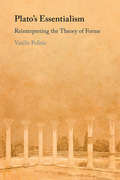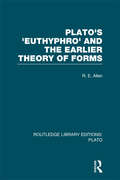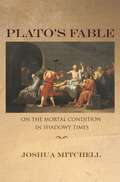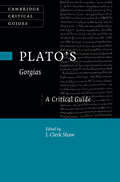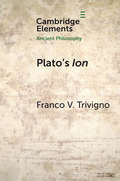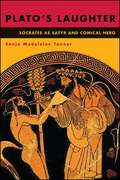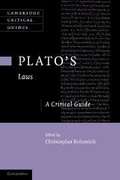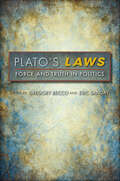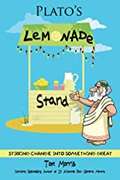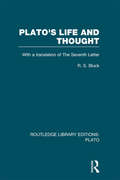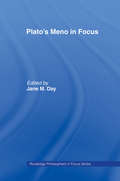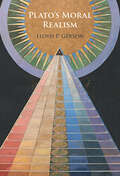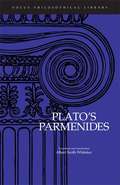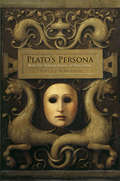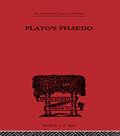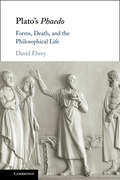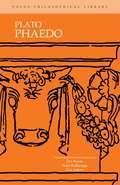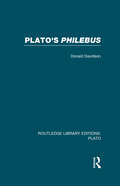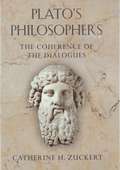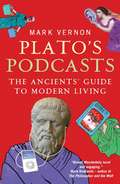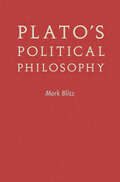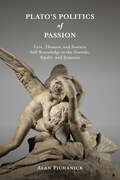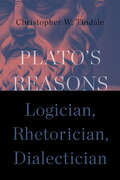- Table View
- List View
Plato's Essentialism: Reinterpreting the Theory of Forms
by Vasilis PolitisIn this book, Vasilis Politis argues that Plato's Forms are essences, not merely things that have an essence. Politis shows that understanding Plato's theory of Forms as a theory of essence presents a serious challenge to contemporary philosophers who regard essentialism as little more than an optional item on the philosophical menu. This approach, he suggests, also constitutes a sharp critique of those who view Aristotelian essentialism as the only sensible position: Plato's essentialism, Politis demonstrates, is a well-argued, rigorous, and coherent theory, and a viable competitor to that of Aristotle. This book will appeal to students and scholars with an interest in the intersection between philosophy and the history of philosophy.
Plato's Euthyphro and the Earlier Theory of Forms: A Re-Interpretation of the Republic (Routledge Library Editions: Plato)
by R E AllenPlato’s Euthyphro is important because it gives an excellent example of Socratic dialogue in operation and of the connection of that dialectic with Plato’s earlier theory of Forms. Professor Allen’s edition of the dialogue provides a translation with interspersed commentary, aimed both at helping the reader who does not have Greek and also elucidating the discussion of the earlier Theory of Forms which follows. The author argues that there is a theory of Forms in the Euthyphro and in other early Platonic dialogues and that this theory is the foundation of Socratic dialogue. However, he maintains that the theory in the early dialogues is a realist theory of universals and this theory is not to be identified with the theory of Forms found in the Phaedo, Republic, and other middle dialogues, since it differs on the issues of ontological status.
Plato's Fable: On the Mortal Condition in Shadowy Times (New Forum Books #40)
by Joshua MitchellThis book is an exploration of Plato's Republic that bypasses arcane scholarly debates. Plato's Fable provides refreshing insight into what, in Plato's view, is the central problem of life: the mortal propensity to adopt defective ways of answering the question of how to live well. How, in light of these tendencies, can humankind be saved? Joshua Mitchell discusses the question in unprecedented depth by examining one of the great books of Western civilization. He draws us beyond the ancients/moderns debate, and beyond the notion that Plato's Republic is best understood as shedding light on the promise of discursive democracy. Instead, Mitchell argues, the question that ought to preoccupy us today is neither "reason" nor "discourse," but rather "imitation." To what extent is man first and foremost an "imitative" being? This, Mitchell asserts, is the subtext of the great political and foreign policy debates of our times. Plato's Fable is not simply a work of textual exegesis. It is an attempt to move debates within political theory beyond their current location. Mitchell recovers insights about the depth of the problem of mortal imitation from Plato's magnificent work, and seeks to explicate the meaning of Plato's central claim--that "only philosophy can save us."
Plato's Gorgias: A Critical Guide (Cambridge Critical Guides)
by J. Clerk ShawPlato's Gorgias depicts a conversation between Socrates and a number of guests, which centers on the question of how one should live. This "choice of lives" is presented both as a choice between philosophy and ordinary political rhetoric, and as a choice between justice and injustice. The essays in this Critical Guide offer detailed analyses of each of the main candidates in the choice of lives, and of how the advocates for these ways of life understand and argue with each other. Several essays also relate the Gorgias to the philosophical and political context of its time and place. Together, these features of the volume illuminate the interpretive issues in the Gorgias and enable readers to achieve a thorough understanding of the philosophical issues which the work raises.
Plato's Individuals
by Mary M. McCabeContradicting the long-held belief that Aristotle was the first to discuss individuation systematically, Mary Margaret McCabe argues that Plato was concerned with what makes something a something and that he solved the problem in a radically different way than did Aristotle. McCabe explores the centrality of individuation to Plato's thinking, from the Parmenides to the Politicus, illuminating Plato's later metaphysics in an exciting new way. Tradition associates Plato with the contrast between the particulars of the sensible world and transcendent forms, and supposes that therein lies the center of Plato's metaphysical universe. McCabe rebuts this view, arguing that Plato's thinking about individuals--which informs all his thought--comes to focus on the tension between "generous" or complex individuals and "austere" or simple individuals. In dialogues such as the Theaetetus and the Timaeus Plato repeatedly poses the question of individuation but cannot provide an answer. Later, in the Sophist, the Philebus, and the Politicus, Plato devises what McCabe calls the "mesh of identity," an account of how individuals may be identified relative to each other. The mesh of identity, however, fails to explain satisfactorily how individuals are unified or made coherent. McCabe asserts that individuation may be absolute--and she questions philosophy's longtime reliance on Aristotle's solution.
Plato's Ion: Poetry, Expertise and Inspiration (Elements in Ancient Philosophy)
by Franco TrivignoThis Element defends an interpretation of Plato's Ion on which its primary concern is with audience reception of poetry. The dialogue countenances and rejects two models of poetic reception, the expertise model and the inspiration model, both of which make the audience entirely passive in relation to poetry; and it presents the character of Ion as a comedic figure, a self-ignorant fool whose foolishness is a function of his passive relation to Homer. In the end, this Element argues that, for Plato, critical engagement is the proper way for audiences to treat poetry. This view holds open the possibility that poetry may express some truths without thereby endorsing the idea that poets are experts who have authoritative knowledge.
Plato's Laughter: Socrates as Satyr and Comical Hero (SUNY series in Ancient Greek Philosophy)
by Sonja Madeleine TannerPlato was described as a boor and it was said that he never laughed out loud. Yet his dialogues abound with puns, jokes, and humor. Sonja Madeleine Tanner argues that in Plato's dialogues Socrates plays a comical hero who draws heavily from the tradition of comedy in ancient Greece, but also reforms laughter to be applicable to all persons and truly shaming to none. Socrates introduces a form of self-reflective laughter that encourages, rather than stifles, philosophical inquiry. Laughter in the dialogues—both explicit and implied—suggests a view of human nature as incongruous with ourselves, simultaneously falling short of, and superseding, our own capacities. What emerges is a picture of human nature that bears a striking resemblance to Socrates' own, laughable depiction, one inspired by Dionysus, but one that remains ultimately intractable. The book analyzes specific instances of laughter and the comical from the Apology, Laches, Charmides, Cratylus, Euthydemus, and the Symposium to support this, and to further elucidate the philosophical consequences of recognizing Plato's laughter.
Plato's Laws
by Christopher BobonichLong understudied, Plato's Laws has been the object of renewed attention in the past decade, and is now considered to be his major work of political philosophy besides the Republic. In his last dialogue, Plato returns to the project of describing the foundation of a just city and sketches in considerable detail its constitution, laws and other social institutions. Written by leading Platonists, these essays cover a wide range of topics central for understanding the Laws, such as the aim of the Laws as a whole, the ethical psychology of the Laws, especially its views of pleasure and non-rational motivations, and whether and, if so, how the strict law code of the Laws can encourage genuine virtue. They make an important contribution to ongoing debates and will open up fresh lines of inquiry for further research.
Plato's Laws: Force and Truth in Politics (Studies in Continental Thought)
by Gregory Recco and Eric SandayReaders of Plato have often neglected the Laws because of its length and density. In this set of interpretive essays, notable scholars of the Laws from the fields of classics, history, philosophy, and political science offer a collective close reading of the dialogue "book by book" and reflect on the work as a whole. In their introduction, editors Gregory Recco and Eric Sanday explore the connections among the essays and the dramatic and productive exchanges between the contributors. This volume fills a major gap in studies on Plato's dialogues by addressing the cultural and historical context of the Laws and highlighting their importance to contemporary scholarship.
Plato's Lemonade Stand: Stirring Change into Something Great
by Tom MorrisWe’ve all heard the old adage: When life hands you lemons, make lemonade. But no one ever says how. Finally, with the inspiration of Plato and the help of many other great philosophers, Tom Morris has figured it out and here gives us a recipe we all can use. Tom blends powerful insights with great stories and good fun to illuminate the path of wise living in the face of challenge and change. Along the way, he shows us how to move with wisdom from difficulty to delight in everything we do.
Plato's Life and Thought: With a Translation of the Seventh Letter (Routledge Library Editions: Plato)
by R S BluckR. S. Bluck’s engaging volume provides an accessible introduction to the thought of Plato. In the first part of the book the author provides an account of the life of the philosopher, from Plato’s early years, through to the Academy, the first visit to Dionysius and the third visit to Syracuse, and finishing with an account of his final years. In the second part contains a discussion of the main purpose and points of interest of each of Plato’s works. There is a chapter on Plato’s central doctrine, the Theory of Ideas, and a translation of Plato’s Seventh Letter, which not only provides valuable additional material for the study of Plato’s thought but also contains a vivid account of many incidents in Plato’s life.
Plato's Meno In Focus (Philosophers in Focus)
by Jane M. DayIn one volume, this book brings together a new English translation of Plato's Meno, a selection of illuminating articles on themes in the dialogue published between 1965 and 1985 and an introduction setting the Meno in its historical context and opening up the key philosophical issues which the various articles discuss. A glossary is provided which briefly introduces some of the key terms and indicates how they are translated. The Meno is an excellent introduction to Plato and philosophy.
Plato's Moral Realism
by Lloyd P. GersonPlato's moral realism rests on the Idea of the Good, the unhypothetical first principle of all. It is this, as Plato says, that makes just things useful and beneficial. That Plato makes the first principle of all the Idea of the Good sets his approach apart from that of virtually every other philosopher. This fact has been occluded by later Christian Platonists who tried to identify the Good with the God of scripture. But for Plato, theology, though important, is subordinate to metaphysics. For this reason, ethics is independent of theology and attached to metaphysics. This book challenges many contemporary accounts of Plato's ethics that start with the so-called Socratic paradoxes and attempt to construct a psychology of action or moral psychology that makes these paradoxes defensible. Rather, Lloyd Gerson argues that Plato at least never thought that moral realism was defensible outside of a metaphysical framework.
Plato's Natural Philosophy
by Thomas Kjeller JohansenPlato's dialogue the Timaeus-Critias presents two connected accounts, that of the story of Atlantis and its defeat by ancient Athens and that of the creation of the cosmos by a divine craftsman. This book offers a unified reading of the dialogue. It tackles a wide range of interpretative and philosophical issues. Topics discussed include the function of the famous Atlantis story, the notion of cosmology as 'myth' and as 'likely', and the role of God in Platonic cosmology. Other areas commented upon are Plato's concepts of 'necessity' and 'teleology', the nature of the 'receptacle', the relationship between the soul and the body, the use of perception in cosmology, and the work's peculiar monologue form. The unifying theme is teleology: Plato's attempt to show the cosmos to be organised for the good. A central lesson which emerges is that the Timaeus is closer to Aristotle's physics than previously thought.
Plato's Parmenides
by Plato Albert Keith WhitakerThis is an English translation of one of the more challenging and enigmatic of Plato's dialogues between Socrates and Parmenides and Zeno of Elea, that begins with Zeno defending his treatise of Parmenidean monism against those partisans of plurality. Focus Philosophical Library translations are close to and are non-interpretative of the original text, with the notes and a glossary intending to provide the reader with some sense of the terms and the concepts as they were understood by Plato's immediate audience.
Plato's Persona: Marsilio Ficino, Renaissance Humanism, and Platonic Traditions
by Denis J.-J. RobichaudIn 1484, humanist philosopher and theologian Marsilio Ficino published the first complete Latin translation of Plato's extant works. Students of Plato now had access to the entire range of the dialogues, which revealed to Renaissance audiences the rich ancient landscape of myths, allegories, philosophical arguments, etymologies, fragments of poetry, other works of philosophy, aspects of ancient pagan religious practices, concepts of mathematics and natural philosophy, and the dialogic nature of the Platonic corpus's interlocutors. By and large, Renaissance readers in the Latin West encountered Plato's text through Ficino's translations and interpretation.In Plato's Persona, Denis J.-J. Robichaud provides the first synthetic study of Ficino's interpretation of the Platonic corpus. Robichaud analyzes Plato's works in their original Greek and in Ficino's Latin translations, as well as Ficino's non-Platonic writings and correspondence, in the process uncovering new aspects of Ficino's intellectual work habits. In his letters and works, Ficino self-consciously imitated a Platonic style of prose, in effect devising a persona for himself as a Platonic philosopher. Plato's dialogues are populated with a wealth of literary characters with whom Plato interacts and against whom Plato refines his own philosophies. Reading through Ficino's translations, Robichaud finds that the Renaissance philosopher seeks an understanding of Plato's persona(e) among all the dialogues' interlocutors. In effect, Ficino assumed the role of Plato's Latin spokesperson in the Renaissance.Plato's Persona is grounded in an extensive study of scholarship in Renaissance humanism, classics, philosophy, and intellectual history, and contextualizes Ficino's intellectual achievements within the contemporary Christian orthodox view of Platonism. Ficino was an influential figure in the early Italian Renaissance: the key intermediary between Greek and Latin, and between manuscript and print, giving voice to Plato and access to the ancient frameworks needed to interpret his dialogues.
Plato's Phaedo: A Translation of Plato's Phaedo (International Library of Philosophy)
by R.S. BluckFirst published in 2000. Routledge is an imprint of Taylor & Francis, an informa company.
Plato's Phaedo: Forms, Death, and the Philosophical Life
by David EbreyPlato's Phaedo is a literary gem that develops many of his most famous ideas. David Ebrey's careful reinterpretation argues that the many debates about the dialogue cannot be resolved so long as we consider its passages in relative isolation from one another, separated from their intellectual background. His book shows how Plato responds to his literary, religious, scientific, and philosophical context, and argues that we can only understand the dialogue's central ideas and arguments in light of its overall structure. This approach yields new interpretations of the dialogue's key ideas, including the nature and existence of 'Platonic' forms, the existence of the soul after death, the method of hypothesis, and the contemplative ethical ideal. Moreover, this comprehensive approach shows how the characters play an integral role in the Phaedo's development and how its literary structure complements Socrates' views while making its own distinctive contribution to the dialogue's drama and ideas.
Plato's Phaedo: With Translation, Introduction and Glossary
by Plato Eva Brann Peter Kalkavage Eric SalemThis is an English translation of one of Plato’s great dialogues of Socrates talking about death, dying, and the soul due to his impending execution. Included is an introduction and glossary of key terms.
Plato's Philebus: Plato: Plato's Philebus (Routledge Library Editions: Plato)
by Donald DavidsonThe Philebus is hard to reconcile with standard interpretations of Plato’s philosophy and in this pioneering work Donald Davidson, seeks to take the Philebus at face value and to reassess Plato’s late philosophy in the light of the results. The author maintains that the approach to ethics in the Philebus represents a considerable return to the methodology of the earlier dialogues. He emphasizes Plato’s reversion to the Socratic elenchus and connects it with the startling reappearance of Socrates as the leading voice in the Philebus.
Plato's Philosophers: The Coherence of the Dialogues
by Catherine H. ZuckertFaced with the difficult task of discerning Plato's true ideas from the contradictory voices he used to express them, scholars have never fully made sense of the many incompatibilities within and between the dialogues. In the magisterial Plato's Philosophers, Catherine Zuckert explains for the first time how these prose dramas cohere to reveal a comprehensive Platonic understanding of philosophy. To expose this coherence, Zuckert examines the dialogues not in their supposed order of composition but according to the dramatic order in which Plato indicates they took place. This unconventional arrangement lays bare a narrative of the rise, development, and limitations of Socratic philosophy. In the drama's earliest dialogues, for example, non-Socratic philosophers introduce the political and philosophical problems to which Socrates tries to respond. A second dramatic group shows how Socrates develops his distinctive philosophical style. And, finally, the later dialogues feature interlocutors who reveal his philosophy's limitations. Despite these limitations, Zuckert concludes, Plato made Socrates the dialogues' central figure because Socrates raises the fundamental human question: what is the best way to live? Plato's dramatization of Socratic imperfections suggests, moreover, that he recognized the apparently unbridgeable gap between our understandings of human life and the nonhuman world. At a time when this gap continues to raise questions--about the division between sciences and the humanities and the potentially dehumanizing effects of scientific progress-- Zuckert's brilliant interpretation of the entire Platonic corpus offers genuinely new insights into worlds past and present.
Plato's Podcasts: The Ancients' Guide to Modern Living
by Mark VernonDo you ever get the feeling that something went wrong? What with credit crunches, the war on terror, and unemployment, it is natural to hark back to less complicated times. In this witty and inspiring book, Mark Vernon does just that. However, he doesn't just look back to the 1980s - try 400BC! Filled with timeless insight into life, relationships, work and partying, Plato's Podcasts takes a sideways glance at modern living and presents the would-be thoughts of Ancient Philosophers on various topics central to our 21st century existence. With a zany cast of characters - from the Gymnosophists (the naked philosophers) to Diogenes, who lived in a barrel - this is a humorous but enlightening manual to living well today (and two thousand years ago). Mark Vernon is a writer, journalist, broadcaster, academic, and former priest. Author of numerous books including Wellbeing and What Not to Say, he is an Honorary Research Fellow at Birkbeck College, University of London, UK, and a frequent contributor for BBC radio and the BBC webportal.
Plato's Political Philosophy
by Mark BlitzThis comprehensive, yet compact, introduction examines Plato's understanding of law, justice, virtue, and the connection between politics and philosophy.Focusing on three of Plato's dialogues—The Laws, The Republic, and The Statesman—Mark Blitz lays out the philosopher's principal interests in government and the strength and limit of the law, the connection between law and piety, the importance of founding, and the status and limits of political knowledge. He examines all of Plato's discussions of politics and virtues, comments on specific dialogues, and discusses the philosopher's explorations of beauty, pleasure, good, and the relations between politics and reason. Throughout, Blitz reinforces Plato's emphasis on clear and rigorous reasoning in ethics and political life and explains in straightforward language the valuable lessons one can draw from examining Plato's writings.The only introduction to Plato that both gathers his separate discussions of politically relevant topics and pays close attention to the context and structure of his dialogues, this volume directly contrasts the modern view of politics with that of the ancient master. It is an excellent companion to Plato's Dialogues.
Plato's Politics of Passion: Erôs, Thumos, and Socratic Self-Knowledge in the Charmides, Republic, and Symposium (SUNY series in Ancient Greek Philosophy)
by Alan PichanickAn original reading of three Platonic dialogues concerned with the soul, tyranny, self-knowledge, and the beautiful.Guided by the question "What is Socratic self-knowledge," this study begins with Plato's Charmides because it is within this work, more than any other, that the utility of self-knowledge becomes the predominant theme. In this dialogue, Socrates explores the possibility of the very culmination of his philosophical investigations—knowledge of ignorance. This happens through an investigation of the perplexing concept, sôphrosunê. Alan Pichanick's approach offers a new perspective upon the perplexing exploration of sôphrosunê in the Charmides by placing much greater emphasis on the neglected "erotic setting" in the dramatic introduction and argues that our reading of the rest of the dialogue should be done in light of this dramatic setting. The erotic setting of the Charmides combined with the discussion of philosophical wonder in the Symposium and tyrannical erôs in the Republic gives guidance about how to think about the potential connection between Socratic self-knowledge and knowledge of the good and also shows why the characters of Charmides and Critias fail to come to such knowledge. Here we have the Platonic diagnosis of the tyrant, whose soul never wonders at anything beyond itself.
Plato's Reasons: Logician, Rhetorician, Dialectician (SUNY series in Ancient Greek Philosophy)
by Christopher W. TindaleThis book explores Plato's implicit understanding of argumentation by reviewing his standing as a logician, rhetorician, and dialectician. The question of his "standing" on these matters is approached on his terms (gleaned from the dialogues) rather than simply from the judgments of commentators. Traditionally, arguments are distinguished as logical, rhetorical, or dialectical, and the source of these distinctions is taken to be Aristotle. This book proceeds on the assumption that Aristotle's tripartite theory of argumentation did not arise in a vacuum and explores the different degrees to which substantive antecedents of parts of that model can be traced to Plato.
